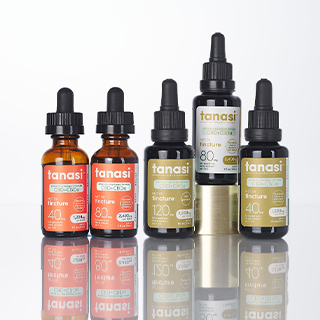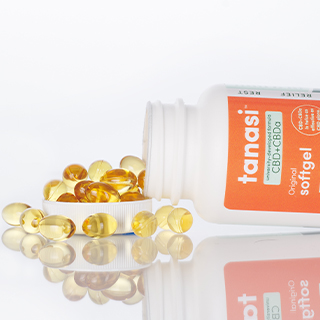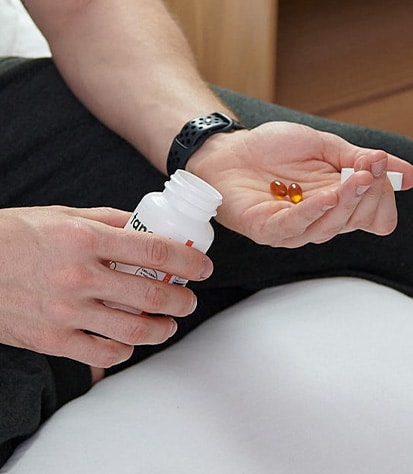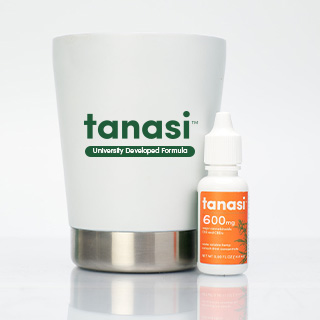Is CBD an Appetite Stimulant?
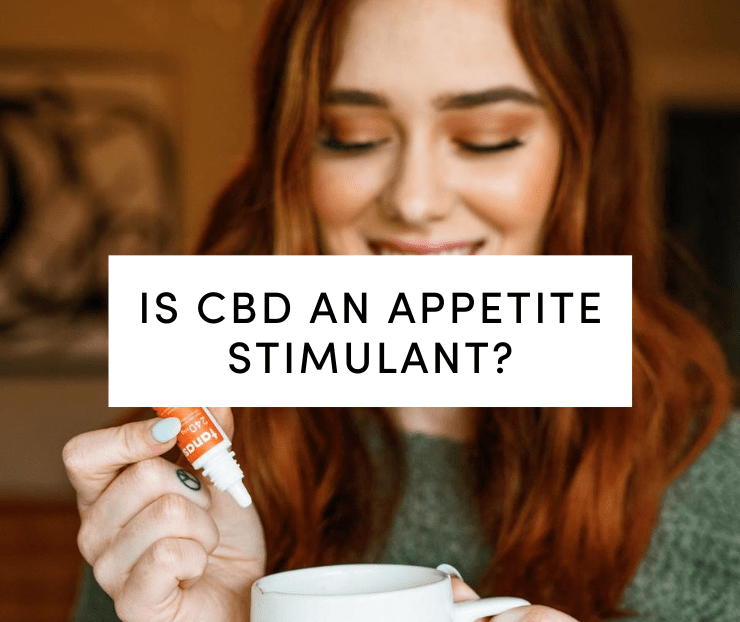
Posted on August 3rd, 2022
You may be familiar with the term munchies, commonly associated with the use of marijuana products. The specific compound largely responsible for stimulating appetite and causing food cravings is the cannabinoid called THC (tetrahydrocannabinol). Most CBD products do not contain more than 0.3% THC as this is the maximum legal amount allowed in any legal product. (Otherwise, it could trigger psychoactive side effects.) This tiny amount of THC should have little to no effects – including causing the munchies. However, there are many other cannabinoids in cannabis that may also have appetite-stimulating qualities – primarily CBD. So, is it possible for CBD and the other cannabinoids to stimulate appetite?
Let’s first look at how appetite works and how it can be regulated and controlled:
How Does Appetite Work?
Hunger is one of the most basic survival instincts and is therefore primarily controlled by the brain. It tells us when we need to eat as well as what we need. When there is an intense craving for certain foods, it shows that the body may have a deficiency in a certain essential nutrient that is contained in that food.
Although appetite and hunger go hand-in-hand, they are different. Appetite refers to wanting to eat rather than needing to eat – like with hunger. It determines what we like to eat, when we eat, and how much we eat. But just like hunger, appetite is controlled by the brain.
When certain chemicals release, they act on neurotransmitters in the brain, telling us when we are hungry and what we feel like eating. These chemicals may directly stimulate appetite or may encourage the production of other chemicals in the body such as Ghrelin.
However, other factors may also influence appetite. Mood, emotions, and feelings can all affect our desire to eat and the type of foods that we crave. For example, eating comfort food is often associated with a sad event or even depression. Anxiety, fear, and stress can all suppress appetite.
Environmental factors such as sights, smells, and even sounds can also affect appetite. Healthy, happy people most often have a healthy appetite whereas those who are suffering from health or mental conditions may have a poor appetite.
 CBD’s Potential as an Appetite Stimulant
CBD’s Potential as an Appetite Stimulant
How Might CBD Affect Appetite?
Of all the potential effects of CBD on the brain and body, its potential effect on appetite has received lots of attention. However, we still have lots to learn about how CBD might affect appetite.
Currently, CBD seems to work with both CB-1 and CB-2 receptors that form part of the endocannabinoid system in the human body. CB-1 receptors are found in the brain, central nervous system (CNS), and throughout the body. CB-2 receptors focus on the immune and gastrointestinal systems of the body.
CBD’s Effect on CB-1 Receptors
How might CBD act on the CB-1 receptors in order to increase appetite? There are three different ways in which CBD may stimulate CB-1 transmitters in the brain and CNS:
- CBD may encourage Ghrelin production (that’s a hormone associated with creating hunger.) Ghrelin production gets stimulated when your body releases chemicals that act on neurotransmitters in the brain.
- This compound could potentially increase Dopamine production which is associated with the reward system in the brain. Eating is rewarding and therefore appetite often increases along with Dopamine.
- CBD may act on serotonin receptors (5-HT) to regulate mood and appetite. Sadness and depression can result in appetite loss or increased comfort food cravings.
There is however some research that shows that CBD may not bind with CB-1 receptors and therefore cannot have the same appetite-stimulating effects as THC. However, the latest research suggests that although CBD may not bind directly with CB-1 receptors, it interacts with them indirectly, possibly working as an appetite stimulant.
CBD’s Effect on CB-2 Receptors
How might CBD act on the CB-2 receptors in order to increase appetite? The CB-2 receptors that form part of the endocannabinoid system are commonly associated with the body’s immune system and therefore general health and well-being. However, these receptors are found dispersed throughout the gastrointestinal system and play a role in every aspect of eating and digestion including:
- Saliva production which starts the digestive process and is often stimulated when feeling hungry.
- Production of stomach acid.
- Peristalsis, which is the contraction and relaxation of the various digestive tracts in order to move food and stool along these tracts.
- Increases the absorption of essential food groups (protein, carbohydrates, fats) and nutrients including vitamins and minerals.
 Other Ways CBD May Act as an Appetite Stimulant
Other Ways CBD May Act as an Appetite Stimulant
Due to the fact that CBD may act on both the brain and the gastrointestinal tract, there are many ways that the compound could increase appetite:
- Mood has a direct relation to appetite and affects how and what we crave and eat. A good mood or positive feelings and emotions can often stimulate appetite and vice versa. On the other hand, negative emotions such as stress, anxiety, and depression can reduce appetite.
- CBD may help reduce symptoms of nausea and vomiting, both of which negatively impact appetite. Nausea and/or vomiting can be the result of a health condition, medication, or other medical treatments and procedures. Research has found that it might have a significant impact on the symptoms of nausea, vomiting, and lack of appetite that are often associated with cancer treatments such as chemotherapy and radiotherapy.
- May help to reduce bloating and symptoms of indigestion such as acid reflux and constipation in order to increase appetite.
- Could help regulate digestive health for faster and more efficient digestion that stimulates appetite for the next meal.
Can CBD Suppress Appetite?
When CBD acts on the CB-1 receptors which are primarily located in the brain, it may have a regulatory effect and therefore could act either as an agonist or antagonist. An agonist binds to neuro-receptors in the brain to promote or stimulate the production of certain chemicals and hormones in the body. An antagonist has the opposite effect, slowing or preventing the production of chemicals and hormones.
In some cases, where excessive eating is of concern, CBD may help reduce Ghrelin production (and therefore the feelings of hunger) and increase chemicals that are released to tell the body that it is full. This process may significantly reduce appetite.
This suggests that CBD products may be used as an appetite suppressant and result in weight loss in some cases. However, the compound is primarily advised to help stimulate appetite rather than act as a weight loss supplement.
Why Is Stimulating Appetite Important?
The human body needs nutrients to survive and thrive. These nutrients are made up of the three food groups as well as essential vitamins, minerals, and trace elements.
The three food groups include:
- Proteins which are primarily the building blocks used to create each cell and build muscle and tissue.
- Carbohydrates which provide the fuel or energy to enable the body and brain to function optimally.
- Fats that aid in gastrointestinal function as well as the function of many other organs and systems within the body.
Vitamins and minerals (sodium, potassium, magnesium, calcium, etc.) play a vital role in assisting the body, as well as the three food groups, with all the different systems in the body and functions of these systems. A deficiency in any of these nutrients can have a dire effect on overall health and well being.
A healthy appetite ensures that all three food groups and the other essential nutrients are consumed and absorbed by the body for overall health. CBD may have the ability to work with the brain and body to help stimulate appetite, improve digestion, and the absorption of essential nutrients.
This becomes especially important when the body is suffering from a health condition or is healing and recuperating from an injury. In the case of cancer, where lack of appetite is often a symptom of the disease as well as a side-effect of treatments, good nutrition is absolutely essential in order to fight the disease. Reducing the symptoms of nausea and vomiting in cancer patients has shown to be beneficial to their recovery and remission.
The Brain-Gut Connection
Recent research has firmly established a clear link between the gut (gastrointestinal system) and the brain. The above information suggests that if CBD stimulates Dopamine and Serotonin production, it may lead to increased appetite. However, what most people don’t know is that this process works in reverse.
A happy gut makes for a happier person. Ways to improve digestion and overall gastrointestinal health are now being used to help manage depression. The potential benefits of CBD for the gut and digestion may indirectly help with symptoms of depression, creating a cycle where happiness leads to improved appetite which results in better gastrointestinal health which makes you happier.

 CBD’s Potential as an Appetite Stimulant
CBD’s Potential as an Appetite Stimulant Other Ways CBD May Act as an Appetite Stimulant
Other Ways CBD May Act as an Appetite Stimulant